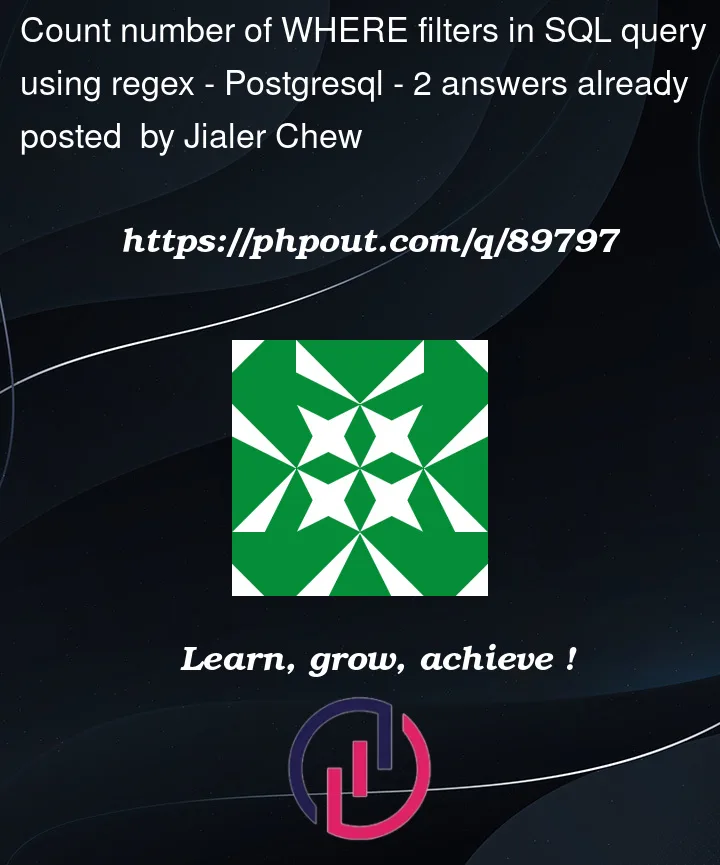Update: I’ve updated the test string to cover a case that I’ve missed.
I’m trying to do count the number of WHERE filters in a query using regex.
So the general idea is to count the number of WHERE and AND occuring in the query, while excluding the AND that happens after a JOIN and before a WHERE. And also excluding the AND that happens in a CASE WHEN clause.
For example, this query:
WITH cte AS (nSELECT a,bnFROM somethingnWHERE a>10n AND b<5)n, cte2 AS (n SELECT c,nd FROM anothernWHERE c>10nAND d<5)n SELECT CASE WHEN c1.a=1nAND c2.c=1 THEN 'yes' ELSE 'no' nEND,c1.a,c1.b,c2.c,c2.dnFROM cte c1nINNER JOIN cte2 c2 ON c1.a = c2.cnAND c1.b = c2.dnWHERE c1.a<4 AND DATE(c1)>'2022-01-01'nAND c2.c>6
-- FORMATTED FOR EASE OF READ. PLEASE USE LINE ABOVE AS REGEX TEST STRING
WITH cte AS (
SELECT a,b
FROM something
WHERE a>10
AND b<5
)
, cte2 AS (
SELECT c,d
FROM another
WHERE c>10
AND d<5
)
SELECT
CASE
WHEN c1.a=1 AND c2.c=1 THEN 'yes'
WHEN c1.a=1 AND c2.c=1 THEN 'maybe'
ELSE 'no'
END,
c1.a,
c1.b,
c2.c,
c2.d
FROM cte c1
INNER JOIN cte2 c2
ON c1.a = c2.c
AND c1.b = c2.d
WHERE c1.a<4
AND DATE(c1)>'2022-01-01'
AND c2.c>6
should return 7, which are:
WHERE a>10AND b<5WHERE c>10AND d<5WHERE c1.a<4AND DATE(c1)>'2022-01-01'AND c2.c>6
The portion AND c1.b = c2.d is not counted because it happens after JOIN, before WHERE.
The portion AND c2.c=1 is not counted because it is in a CASE WHEN clause.
I eventually plan to use this on a Postgresql query to count the number of filters that happens in all queries in a certain period.
I’ve tried searching around for answer and trying it myself but to no avail. Hence looking for help here. Thank you in advanced!




2
Answers
You can try something like this:
The idea is to match the text after
WHEREclause:and then simply count the ANDs and add one because of the matched WHERE.
I try to stay away from lookarounds as they could be messy and too painful to use, especially with the fixed-width limitation of lookbehind assertion.
My proposed solution is to capture all scenarios in different groups, and then select only the group of interest. The undesired scenarios will still be matched, but will not be selected.
JOIN(undesired)WHERE(desired)CASE(undesired)Note: Feel free to replace

WHERE|JOIN|CASE|ENDto any keyword you want to be the ‘stopper’ words.All scenarios including the undesired ones will be matched, but you need to select only Group 2 (highlighted in orange).